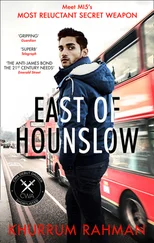Boyle Coraghessan - East is East
Здесь есть возможность читать онлайн «Boyle Coraghessan - East is East» весь текст электронной книги совершенно бесплатно (целиком полную версию без сокращений). В некоторых случаях можно слушать аудио, скачать через торрент в формате fb2 и присутствует краткое содержание. Жанр: Старинная литература, на английском языке. Описание произведения, (предисловие) а так же отзывы посетителей доступны на портале библиотеки ЛибКат.
- Название:East is East
- Автор:
- Жанр:
- Год:неизвестен
- ISBN:нет данных
- Рейтинг книги:5 / 5. Голосов: 1
-
Избранное:Добавить в избранное
- Отзывы:
-
Ваша оценка:
- 100
- 1
- 2
- 3
- 4
- 5
East is East: краткое содержание, описание и аннотация
Предлагаем к чтению аннотацию, описание, краткое содержание или предисловие (зависит от того, что написал сам автор книги «East is East»). Если вы не нашли необходимую информацию о книге — напишите в комментариях, мы постараемся отыскать её.
East is East — читать онлайн бесплатно полную книгу (весь текст) целиком
Ниже представлен текст книги, разбитый по страницам. Система сохранения места последней прочитанной страницы, позволяет с удобством читать онлайн бесплатно книгу «East is East», без необходимости каждый раз заново искать на чём Вы остановились. Поставьте закладку, и сможете в любой момент перейти на страницу, на которой закончили чтение.
Интервал:
Закладка:
She found her way to Hiro’s floor. The nurse on duty, a short black woman with cornrow braids and earrings that were like paperweights, gave Ruth the sort of double take she might have lavished on a Di or a Fergie or Donna Summer herself, and then led her past a bored-looking deputy and into Hiro’s room. Hiro was propped up in bed, looking wan, his skin and the whites of his eyes faintly yellowish, as if they were tarnished. His face, which seemed impassive, dead, the face of a stone Buddha, came to life when he lifted his eyes to Ruth’s. “Rusu,” he said, and though he was depressed, though he was hurt, sick and defeated, he couldn’t disguise his pleasure, and he gave her a quick fading glimpse of his crooked smile.
Ruth had no illusions about the story—Hiro’s story. Her story. It probably had a half-life of about three days. It was one of those things that for some unfathomable reason gets the whole country worked up to a fever pitch and then dwindles away to nothing, yesterday’s news, a dim glimmer in the collective memory. She knew that. But she was confident she could get the book done in six months—it was her own story, she was on the inside of it—and rekindle that glimmer into a spark. And so did her publisher, obviously. The reporters out front were giving them publicity you couldn’t buy. “Hiro,” she said, and she crossed the room to him.
She took a seat beside the bed. There was a silence. The deputy poked his expressionless face in the door and then took it away again. “How are you feeling?” she said finally, and she dug around in her purse for the little gift-wrapped box of sweet bean cakes she’d brought him. “I brought you something,” she said, setting the package on the table. The deputy stuck his face in the door again, then he moved into the room, striding purposefully, and he took the package from the table and held his hand out for Ruth’s purse. “Ah’m not gone frisk you,” he said, “but Ah’m watchin’,” and then he returned to his station.
“So, how are you feeling?” Ruth repeated. “They treating you well? Is there anything I can get you?”
Hiro said nothing.
“How about your grandmother? Do you want me to write her? Phone her?”
Hiro didn’t respond. There was another silence. After a long while he turned his mournful eyes on her and said: “You lie to me, Rusu.”
Now it was her turn. She waited.
“In the house,” he said, and his voice sounded parched, dried up, torn out by the roots, “you are the one. You tell them I am here.”
So that was it. She wasn’t going to have to defend herself over the boat and the swamp and Turco—apparently that was lost to him. He was taking her back to Tupelo. All this time he thought she was the one who’d betrayed him. “No,” she said.
“Yes. You never have any idea to take me to mainrand.”
“No. It was Saxby. He saw you there on the porch and he went to the police without telling me. I never knew till it was too late.” She lowered her voice. “I did want to help you. I do. I still do.”
He gazed out the window. They were five stories up. There was nothing to see but dead clouds in a dead sky. “I’m tired,” he said after a moment.
She wanted to tell him not to worry, that everything was going to be all right, that she’d look after him and get her father to help and Dave Fortunoff too—he was well connected in Savannah—but she couldn’t. She felt awkward. He looked terrible. The deputy was watching her. “Okay,” she said, rising from the chair, “I understand. It’s all right. I’ll come back tomorrow, okay?”
He glanced up at her, struggled to lift his hand from the sheets and spread his palm in valediction. “I say goodbye now.”
She felt for him in that moment, a quick sharp flooding of the glands, and she bent forward to touch her lips to his cheek, guard or no guard. “See you tomorrow,” she said.
He never answered.
The City of Brotherly Love
The dreams were of things he couldn’t admit, dreams OF torment and horror and hate. They came at him as he drifted in some disembodied realm where colors flashed in his eyes and faces bled into one another without reason or chronology. And a hiss, always a hiss, as of the air rushing from a punctured lung. He saw Chiba become Wakabayashi and Wakabayashi become Unagi and felt the slap of their multiple hands. He saw his mother at the bottom of the pond, her ravaged fingers, the rictus of her mouth, and the hiss became a scream, silent and prolonged. He saw Ruth and her face was the face of his captors and tormentors, and it was their hate that burned in her eyes. And then he saw himself, and he was at the bottom of the dead black endless American swamp, his flesh gone white, flaking, dropping from the bone, and then he was rising, apart from himself, above them all, rising toward the trembling aqueous light of the surface.
He emerged on a room in a hospital in the bright light of day. Above him floated a bag of clear liquid that fed its way through a tube and into his arm. He tried to lift his arm but found that he couldn’t. There was a man at the door, a long-nose in uniform. A nurse—she was a Negro—hovered over him. “Well,” she said, “at last. Feeling better?”
Better? He was feeling nothing, nothing at all. He’d been swallowed by the crocodile and he’d been living in its belly. He looked at the nurse and saw the grinning mouth and the serrated tail and his eyes fell shut and the dreams rushed over him again.
In the morning—at least they told him it was morning, and for lack of any standard against which to measure the information, he took their word for it—the great gift of consciousness was restored to him. Or perhaps it wasn’t such a gift after all. He saw the long-nose at the door and understood, without recalling the details perhaps, but in a syllogistic way, that he’d failed, that he was a prisoner once again, that the world and his life within it were hopeless. A doctor examined him, asked inane questions: How did this feel? Did he know where he was? Who he was? It felt bad. He was in the custody of the hakujin police. He was a happa, a butter-stinker, half a long-nose. He didn’t bother to answer.
In the afternoon another long-nose appeared, very well dressed, and introduced himself as his legal counsel. With him was a Japanese—a non-butter-stinker, pure bred, a member of the august and nonpareil Yamato race—the first such Hiro had laid eyes on since making his leap from the wingdeck of the Tokachi-maru. He was short and soft, this Japanese, with a puffy face, closely cropped hair and glasses that were too big for his head. His name was Hanada and he spoke with a northern accent and a breeziness that seemed inappropriate to the situation. But then the long-nose began to speak and Hanada-san became a machine, interpreting the hakujin’s words in a flat mechanical voice. Hiro, he explained, was too ill to go to court—there was no question of that—and so he would be arraigned here at the hospital, via videotape. (And sure enough, even as he spoke, three more butter-stinkers edged into the room, two fondling briefcases and another balancing a video camera on his shoulder.)
Hiro wanted only to hide himself. He was defeated, humiliated, a failure like his hopeless mother and his hippie father. He refused to speak to any of them, in English or Japanese. The first long-nose, his counsel, listened to a lengthy list of charges and entered a plea for him: Not guilty.
Well, yes, of course he wasn’t guilty—that went without saying. Not guilty of any of their meaningless charges, anyway. What he was guilty of was stupidity, naïveté, guilty of thinking the Amerikajin would accept him in common humanity. He was wrong, and that was his crime. He had failed, and that was his fate.
Читать дальшеИнтервал:
Закладка:
Похожие книги на «East is East»
Представляем Вашему вниманию похожие книги на «East is East» списком для выбора. Мы отобрали схожую по названию и смыслу литературу в надежде предоставить читателям больше вариантов отыскать новые, интересные, ещё непрочитанные произведения.
Обсуждение, отзывы о книге «East is East» и просто собственные мнения читателей. Оставьте ваши комментарии, напишите, что Вы думаете о произведении, его смысле или главных героях. Укажите что конкретно понравилось, а что нет, и почему Вы так считаете.











